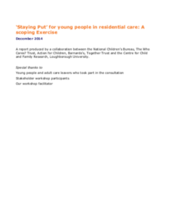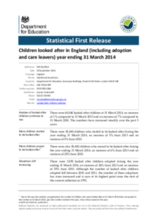

Displaying 1461 - 1470 of 1649
Through a desk review of peer reviewed journal and “grey” literature published in English and Russian languages, this paper provides a review of current deinstitutionalization efforts in the region, identifies potential challenges, describes the need for economic empowerment interventions, and outlines directions for future research.
This report explores options for young people aging out of residential care (“care leavers”) and the potential challenges and costs of effective implementation of those options.
Eurochild is holding its 11th Annual Conference, 'Children First: Better Public Spending for Better Outcomes for Children and Families' in Bucharest, 26-28 November 2014
Save the Children UK is looking to hire a Deputy Head of Child Protection on a Fixed term contract until mid-January 2016
Using the accumulated wisdom of a select group of accomplished managers, academics and policy makers in social work and social care, this paper retrospectively reviews the evolution of Family Support within the Irish context and distils the core characteristics of Family Support practice and service delivery.
This article highlights the findings and recommendations from the report on sexual exploitation in Greater Manchester. According to the article, the report found that of the 3,242 individuals reported missing to Greater Manchester Police, 530 were in care. The report stated that one in five of those reported missing in Greater Manchester were at risk of serious harm, including Child Sexual Exploitation
Better Volunteering, Better Care steering committee member Hope and Homes for Children, and project team member Daniela Papi participated in a panel on volunteering with children at this Tourism Concern event in the UK in October.
This report includes the statistical information regarding looked-after children in the UK for the year 1 April 2013 to 31 March 2014.
A police force in South Yokshire, UK is criticised for turning a blind eye to the sexual exploitation of 1,400 children in Rotherham has been further rebuked for “weaknesses” in its child protection procedures.
The Oak Foundation and The International Centre: Researching Child Sexual Exploitation, Violence and Trafficking at the University of Bedfordshire are supporting this 0.5 post to develop a greater focus on actions taken by young people to combat sexual violence against children, including strategies for developing youth participation undertaken by international service providers.



